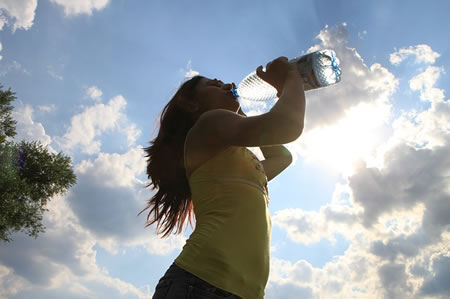Friends asking for nutrition advice are often surprised when my first recommendation is to drink more liquid. Water is an important nutrient and has a vital role in maintaining good health.
Don't assume that you are drinking enough just because you are not thirsty. As we age, our sense of thirst diminishes, so we don't realize as easily when our body needs more fluids.
Further, many older persons who suffer from arthritis and similar problems that make moving painful deliberately decrease their fluid intake in order to reduce trips to the bathroom.
Water is essential to our body functions. It is a major component of blood and body fluids (saliva, digestive juices, intracellular fluids, and joint compounds), and key to the digestive process.
Water moves food through our system and transports nutrients to various body locations. It is also critical to the body's waste system as it helps to filter and eliminate toxins and move waste materials through the intestines.
Experts have recommended 6-8 cups per day for years, but recent studies have raised this amount even further to 10 cups for women and 12 cups for men.
All liquids count toward the 10 to 12 cup goal, but bear in mind that both caffeine and alcohol act as diuretics and may actually increase normal fluid losses. Ten good reasons to increase your fluid intake:
- Jump Start Your Body: While your brain may respond to caffeine in the morning, water helps the rest of your body get moving. It starts by helping to relieve dry mouth and continues to work the magic of motion throughout your system.
- Avoid Constipation: Something as simple as fluid plays a major role in preventing constipation. Not only does the liquid encourage bowel movement, but it also softens the stools.
- Help Nutrient Absorption: Water is the carrier that helps the body transport and absorb the nutrients in the food we eat. Water moves these nutrients through our cells and ensures that the nutrients are available when and where we need them.
- Make the Medicine Go Down: Instructions for nearly all medications are to take with water. Pharmaceutical companies want their medicines to function in the most effective way possible. Water helps to hurry the medication along in your system and to get it everywhere it needs to go.
- Moisturize Your Skin: Water is the single most important element for cellular integrity. Keep your skin in good shape from the inside out by getting plenty of water.
- Flush Your System: Our kidney system is unique in its filtering capabilities and totally dependent upon water in order for it to work. Daily fluid intake is essential to its efficient operation, particularly because there is some decrease in function with age.
- Avoid muscle cramps: Although not the only element associated with muscle cramps, athletes have long recognized that even mild dehydration can produce cramps.
- Prevent kidney stones: Stone prevalence is documented as being higher in those persons with low urinary volume. "More fluids" is the first and foremost treatment when kidney stones occur.
- Avoid Dehydration: An alarming number of hospitalizations of older persons include dehydration as part of the diagnosis. This can be avoided by monitoring your fluid intake. Both mental and physiological performance may be impaired with even mild dehydration.
- Keep well: In addition to being critical to digestion, nutrient absorption, and waste removal, water is a major player in regulating body temperature and in maintaining electrolyte balance. New studies have also shown a possible correlation between low fluid intake and bladder, colon, breast, prostrate, kidney, and testicle cancers.
Be sure to drink even more fluid whenever you increase your physical activity, when eating a high fiber diet, during hot weather, at high altitudes, in low humidity locations, and when you're sick, especially if you have a fever, vomiting, or diarrhea. Check your urine color. It should be pale, almost clear. A dark yellow means you need more fluids.
Start drinking water early in the day, and always drink water after going to the bathroom. Refresh yourself by adding a slice of lemon or lime like they do at the spas. Or try sparkling water for a change!
JoAnn Prophet, MS, RD
AICR









